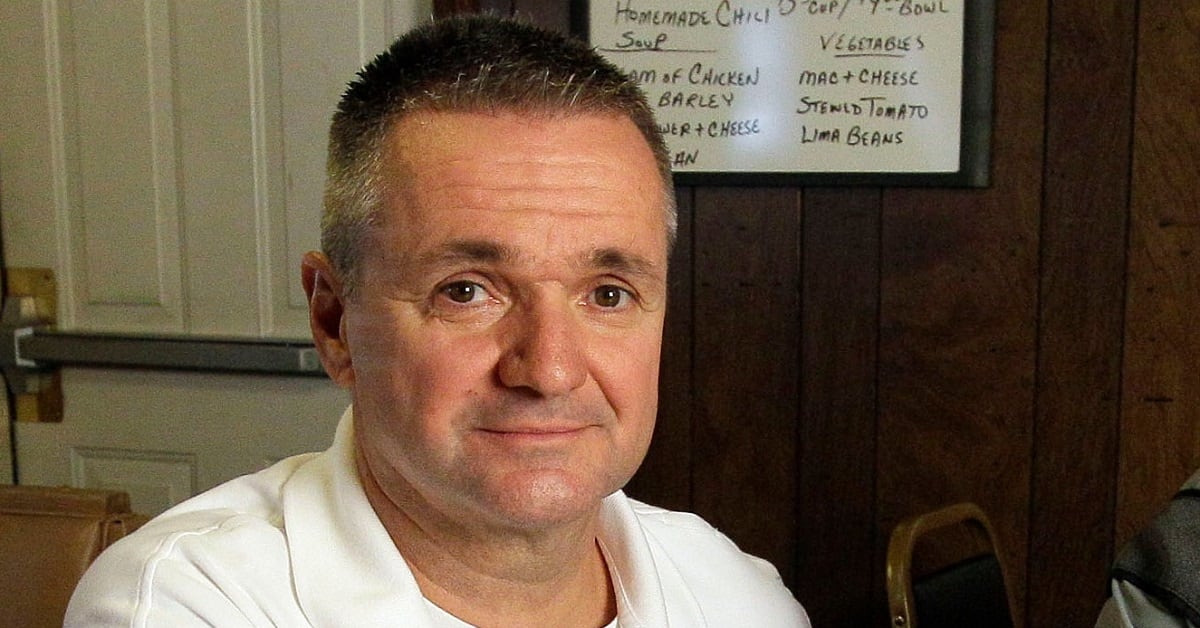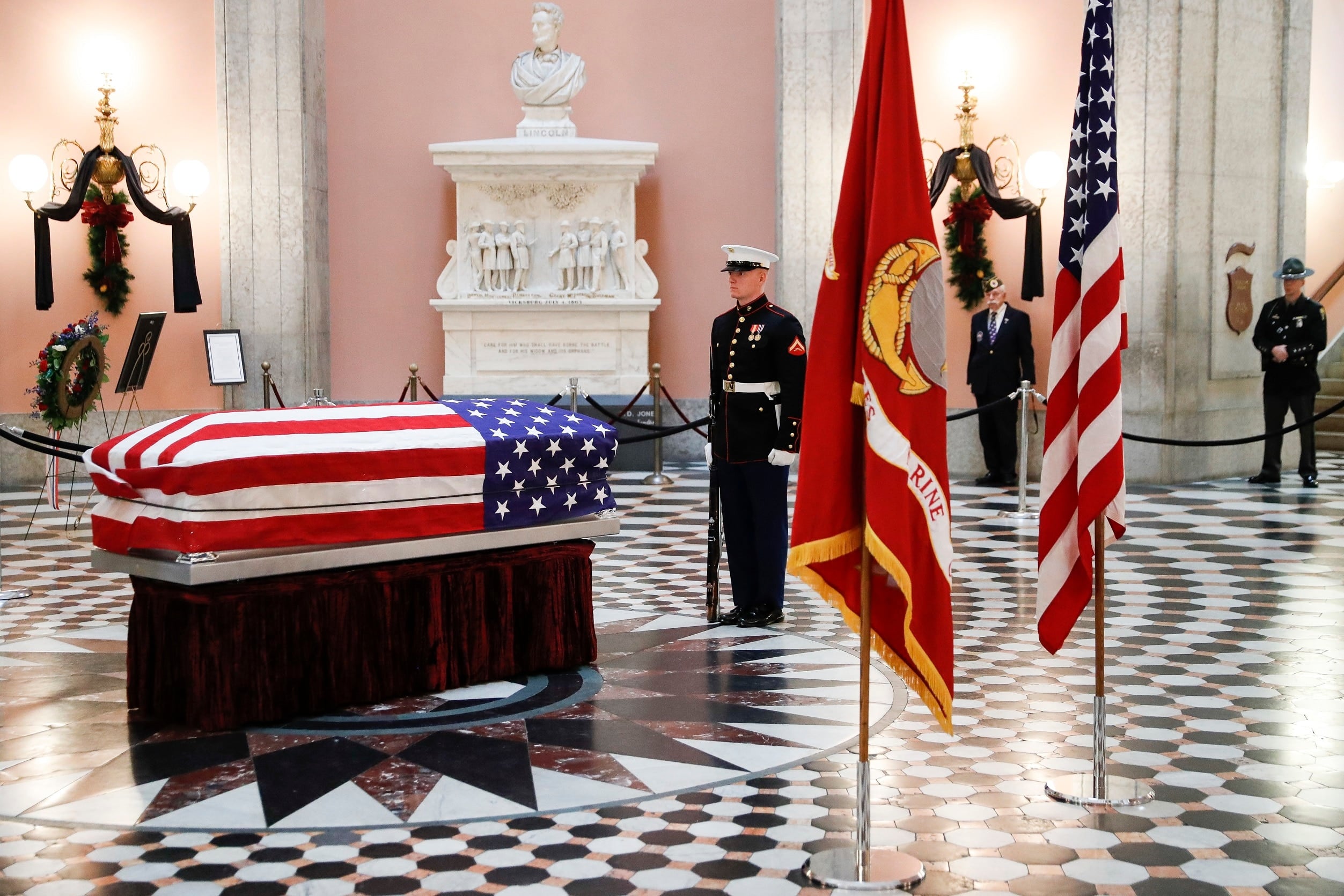A senior employee at Dover Air Force Base, Delaware, acted inappropriately by offering inspectors a peek at American icon John Glenn’s body while the body awaited burial in early 2017, Air Force investigators found.
It wasn’t the only case of inappropriate behavior involving the bodies of fallen service members by the employee outlined in a report obtained under a Freedom of Information Act request by Military Times: In one instance involving the severed ear of a service member, the employee allegedly leaned over the remains and yelled, “Can you hear me?”
The behavior was confined to a single individual, and there was no systemic problem at the mortuary, investigators found, in the course of 34 formal interviews, talking to 50 witnesses, and reviewing numerous documents. The name of the individual was redacted from the report, but Military Times reported in May 2017 that the Air Force IG was investigating concerns raised by a Defense Department official about the behavior of William Zwicharowski, then-mortuary branch chief, during the visit of her inspection team in February and March 2017.
“The evidence indicated that human remains were consistently treated with dignity and respect at the [Dover Port Mortuary],” investigators concluded.
But this employee acted improperly as a supervisor, and failed to maintain conduct and discipline expected at the mortuary, they concluded.
During the investigation, the employee was detailed to another position, and never returned to work at the Dover Port Mortuary, said Air Force spokeswoman Ann Stefanek. Although the investigation substantiated several allegations of inappropriate behavior by the employee, “earlier this spring, the former employee retired before any administrative active decisions had been made,” she said. None of the allegations involved criminal activity.
“The Air Force expects — and will firmly enforce — the highest standards of conduct, competence and caring as we carry out our sacred duties at Air Force Mortuary Affairs Operations,” Stefanek said.
The investigators found that Glenn’s remains were treated with dignity and respect while at the Dover mortuary. Glenn, who in 1962 became the first American to orbit Earth, was 95 when he died Dec. 8, 2016. A combat-decorated Marine, he was buried at Arlington National Cemetery with full military honors April 6, 2017, on what would have been his 74th wedding anniversary. Glenn’s family asked the military to care for his remains in the interim.
In February and March, when a DoD mortuary inspection team was conducting a scheduled inspection, Zwicharowski allegedly offered to allow the inspectors to view Glenn’s remains.
“I found this offer to be clearly inappropriate and personally shocking,” wrote Deborah Skillman, DoD director of casualty and mortuary affairs, in the memorandum about the events.
And despite being counseled about the offer, Zwicharowski allegedly made a second offer, a few days later, to inspectors.

While Zwicharowski told investigators that he wanted to show the quality of care when he made the offer, “the preponderance of evidence indicated that [he] offered to show the inspection team Senator Glenn’s remains in order to highlight his own importance ....” investigators stated. They concluded he failed to conduct himself “in a manner required to afford human remains a uniformly high level of dignity and respect.”
Because the inspection team declined the offer, and no one else apparently viewed Glenn’s remains who had no need to do so, investigators determined that his body was treated with dignity and respect at all times while at Dover.
Skillman noted in her May 2017 memo that Zwicharowski made comments indicating he believed the inspection was an act of reprisal for having exposed, six years prior, how the mortuary mishandled the remains of some fallen service members returning home from the battlefields of Afghanistan and Iraq. She disputed that in the memo, writing “it is important to note that this inspection was pursuant to a new DoD inspection policy, and three other sites had been inspected prior to the team’s inspection of Dover.”
RELATED

‘Can you hear me?’
In the process of investigating the concerns surrounding John Glenn’s remains, investigators learned about a number of other incidents involving Zwicharowski’s leadership, including three events they investigated involving alleged inappropriate behavior around fallen service members’ remains.
Investigators examined a memo about one incident, when Zwicharowski allegedly “leaned over and yelled ‘can you hear me?’ into the ear of a fallen service member,” according to the report.
Zwicharowski told investigators that if he did say those words into a detached ear, it was his way of coping with a stressful situation. The evidence didn’t indicate he picked up the ear when making the comment.
As a supervisor, the employer also had a responsibility to set and maintain standards. The investigator determined that the “behavior was contrary to the [Dover Port Mortuary’s] mission of ensuring dignity and respect to the nation’s fallen and thus not only was improper, it also detracted from [the employee’s] character as a supervisor.”
Obscene gesture?
In another instance, Zwicharowski allegedly manipulated the tendons of a service member’s severed arm so that the middle finger moved up in an obscene gesture. The investigator determined that he may have manipulated the tendons in the process of making the hand look more natural in the casket, but when another employee saw it, he interpreted it as a joke and laughed.
The investigator said Zwicharowski had a responsibility to let the employee know why he was moving the tendons, and correct any misperceptions about using human remains to make a joke.
Zwicharowski had a responsibility to ensure human remains he was caring for were treated with dignity and respect, the investigator stated, and that included establishing a respectful atmosphere. The investigator found that Zwicharowski’s behavior was improper.
Investigators looked into another report where Zwicharowski allegedly picked up a severed hand in a bag, and asked, “Does anybody need a hand?.” A chaplain told the investigator he was present during the incident which was more than five years ago, and it was a time when the mortuary was extremely busy.
“It was a smile moment and it was an offer of help all the way around the room," the chaplain told investigators. "… There was nothing inappropriate in it ... from my point of view. … I would say that I have worked along with and been a pastor chaplain to local funeral homes and the kind of atmosphere that you would find downstairs at your local funeral home is much like what you would see at the mortuary. In order to maintain sanity, humor is a constant help.. I’ve never seen anything regarding the port mortuary and bodies … that was anything less than dignity, honor and respect.”
While the words used may not have been the preferred choice, the investigator stated, in this instance, Zwicharowski didn’t engage in improper conduct in the presence of human remains.
While two of the three events were improper behavior, the investigator noted, that the three actions identified during the investigation showed a downward trend in Zwicharowski’s conduct.
Zwicharowski could not be reached for comment.
Karen has covered military families, quality of life and consumer issues for Military Times for more than 30 years, and is co-author of a chapter on media coverage of military families in the book "A Battle Plan for Supporting Military Families." She previously worked for newspapers in Guam, Norfolk, Jacksonville, Fla., and Athens, Ga.





